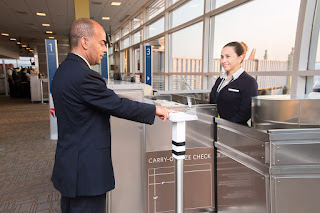The future of airport boarding: Thales’s digital token technology
After the boarding gates reopen for passengers, the focus has been on longer passenger trails, contactless boarding options, and expediting passenger processing cases, and has been noted.
Trade service supplier Thales is assisting in this journey with the introduction of biometric solutions, contactless boarding and more. A new resolution known as 'Fly to Gate' aims to strengthen the travel expertise of passengers while providing a secure and contactless airport expertise using digital tokens.
The digital token can be used to send a person – with or without a mask – at different points throughout the airport in less than a second, reducing passport management and boarding cases by an average of 30%. could.
Thales Fly to Get Resolution is designed to enhance the travel experience for passengers through enhanced convenience, while at the same time boosting security at five airport locations. The main goal of the technology is to use identity verification and facial biometrics to create a seamless journey for passengers, eliminating the need to present a ticket or ID at each checkpoint.
Passengers simply take the test via their airline's mobile app and are then immediately verified with a face recognition software program, using a mix of a selfie, liveness detection and a doctor authenticity test.
The facial recognition software program checks a number of factors on the passenger's face and can operate with or without a mask. As soon as the verification is complete, a concise digital token is created for each passenger, allowing them to be identified at check-in, bag drop off, security, passport management and at the boarding gate – all without any paperwork. The technology works in real-time – as soon as the token is erased after a flight – and reduces boarding instances at the gates by a third.
When is this technology available, has it been tested?
Thales provides software programs for fly-to-gate resolution and physical infrastructure, such as border kiosks for airports, are now accessible to the market.
We've run a lot of pilots across Europe (Spain, France) and the US (Dallas, LA), all of which have really helped demonstrate the effectiveness and safety of the system.
Additionally, a new rule in the European Union calls for members to be ready with an entry-exit system (EES) before the middle of 2022. The technology is now available – deployment of EES kiosks has already started in France – and relies on Thales' experience in ID verification and biometric authentication.
All our options are GDPR-compliant and they are all designed with security by default when it comes to cyber security. Extremely delicate biometric information is processed in a secure manner using ultra-sophisticated encryption mechanisms.
This means that if hackers enter any information, they will not use it outside the system, leaving it out of date. In addition, the digital token created by the fly-to-gate system (which is a mathematical representation of the passenger) is destroyed after take-off.
All this is defined by the passengers prior to the exercise of the options, and therefore must give their consent. Tests have proved that travelers are smoked by the new applied sciences if these are properly defined and it appears that their information is properly protected.
It reaffirms the importance of airports and their peers, reminds Thales, in providing clear and reassuring information to travelers with the ultimate vision of embarking on that digital transformation journey.
Doctor counterfeiting is a profitable venture and it is not uncommon for people to file multiple identification paperwork. That's why regulations around the world ask nations to offer residents with digital paperwork, with a chip acting like a vault for a retailer and securing all delicate and private information. The digital paperwork in polycarbonate is clearly reducing the chances of a solid doc.
“While hackers will try to circumvent all the time, the way forward for identity authentication is more likely to be paperless and know-how like biometrics is the easiest way to combat the degree of identity fraud that we have traditionally have seen."
While hackers will attempt to circumvent all the time, the path forward for identity authentication is more likely to be paperless and, like biometrics, it is the easiest way to combat the degree of identity fraud traditionally seen.
While other touchless plans may focus on a specific location, our Fly to Get solution is designed to reinforce the entire buyer journey from check-in – which will be done at home – through take-off.
Tags:
Teachnolgy
